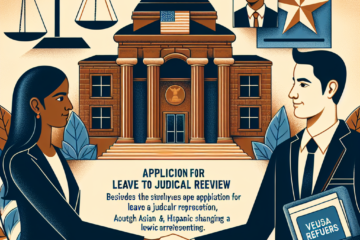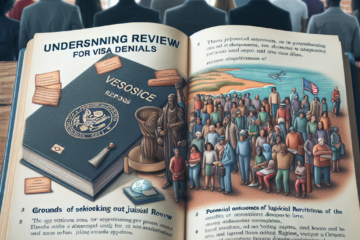Another Judicial Review Win!
SALVA ROUDEHCHIANAHMADI AND MILAD DAMIRCHI (Applicants) and THE MINISTER OF CITIZENSHIP AND IMMIGRATION (Respondent)
Table of contents
I. Introduction
[1] This application seeks judicial review of a Visa Officer’s [the Officer] decision, dated June 18, 2022, which rejected the Applicant’s request for a study permit under section 216(1) of the Immigration and Refugee Protection Regulations, SOR/2022-227 [IRPR], and, as a result, denied her husband’s application for an open work permit [the Decision].
[2] The application is granted for the reasons discussed below.
II. Context
Background facts
[3] The Applicant is an Iranian citizen who applied for a study permit to study in Canada, accompanied by her husband. The couple has no children but has family members in Iran. The Applicant holds a Master’s Degree in Architectural Engineering and a Bachelor of Science in Information Technology from Iranian universities and has worked as an Architectural Engineer since 2019.
[4] The Applicant’s goal in applying for a study permit was to further her education by pursuing a two-year Master’s Degree in Energy Management at the New York Institute of Technology [NYIT] campus in Vancouver, BC. The estimated tuition for one academic year at NYIT is USD $21,207.85, with the Applicant having prepaid a USD $7,781.85 tuition deposit. According to her application, the Applicant’s employer had offered her a promotion to “Senior Architect” upon completing a Master’s degree in Energy Management from a developed country. Additionally, the employer offered a scholarship of approximately CAD $3,250.00 in exchange for her continued employment after finishing the program.
A. Decision under review [5] The Officer refused the Applicant’s study permit application on June 18, 2022, for the following reasons:
- The Applicant’s assets and financial situation are inadequate to support her stated travel purpose and any accompanying family members, and
- The purpose of her visit to Canada is inconsistent with a temporary stay, considering the details provided in her application.
[6] The accompanying Global Case Management System (GCMS) notes, which contribute to the rationale, state:
Upon reviewing the application, I found that evidence of available funds from assets such as a vehicle, rental properties, or potential income has not been included in the calculation of available funds. Due to Iran’s unstable economic climate and international exchange rate fluctuations, I assign less value to the claimed available funds. Considering the applicant’s study plans, the provided documentation does not demonstrate that funds would be sufficient or accessible. I am not convinced that the proposed studies would be a reasonable expense. The applicant is applying to study for a Masters in Energy Management, having already obtained a Masters in Architecture and currently employed as an Architect. The client has previous studies at the same academic level as the proposed studies in Canada. The offer for Senior Architect upon completing the program is noted. However, considering the applicant’s education and previous work experience, I am not satisfied that the applicant would not have already acquired the skills or benefits of this program. Given the applicant’s prior study and current career, I am not convinced that this is a reasonable progression of studies. After evaluating the factors in this application, I am not satisfied that the applicant will leave Canada at the end of the authorized stay period. Due to the above reasons, I have refused this application.
[7] In a related decision, the Applicant’s husband’s work permit application was also denied on the basis that the purpose of his visit to Canada was inconsistent with a temporary stay, considering the details provided in his
III. Issues and Standard of Review
[8] Although the Applicant proposes that the Decision involves both reasonableness and procedural fairness in her written materials, she does not provide specific arguments on the latter issue.
[9] Based on the evidence and the parties’ submissions, the only issue is whether the Decision is reasonable. Reasonableness is the presumed standard of review for administrative decisions on their merits: Canada (Minister of Citizenship and Immigration) v Vavilov, 2019 SCC 65 [Vavilov].
[10] To determine if the decision is reasonable, the reviewing court must examine “whether the decision displays the hallmarks of reasonableness – justification, transparency, and intelligibility – and whether it is justified in relation to the relevant factual and legal constraints that influence the decision”: Vavilov at paras 86 and 99.
[11] This case focuses on the Officer’s two primary conclusions: (1) that the Applicant did not prove she has adequate financial resources to support her stated purpose for traveling to Canada, and (2) that the Applicant’s planned studies are unreasonable and inconsistent with a temporary stay in Canada.
IV. Analysis A. The sufficiency of the Applicant’s funds to support the stated purpose of travel [12] The Applicant argues that the Officer failed to consider relevant evidence in the record, including evidence of assets, and based the decision on “subjective speculations and unfounded generalizations.” She claims that the Officer did not justify the conclusion that her ability to support herself and her husband was not adequately demonstrated. The evidence of available funds was sufficient to support them for the first year of her studies, which is all that the Minister’s operational instructions and guidelines on study permits require: Cervjakova v Canada (MCI), 2018 FC 1052 at para 14; Chantale v Canada (MCI), 2021 FC 544 at para 11; Barril v Canada (MCI), 2022 FC 400 at para 15 [Barril]; Naeem v Canada (MCI), 2022 FC 391 at para 22; Motlagh v Canada (MCI), 2022 FC 1098 at para 25; Lingepo v Canada (MCI), 2021 FC 552 at para 20; Jalilvand v Canada (MCI), 2022 FC 1587 at para 16.
[13] The Respondent submits that an officer is presumed to have considered all the evidence and is not required to reference each piece of evidence in their reasons, and the obligation to provide reasons for any temporary resident application is “minimal”: Solopova v Canada (MCI), 2016 FC 690 at para 28; Zamor v Canada (MCI), 2021 FC 479 at para 20-22.
[14] The Respondent concedes that the guidelines indicate that student applicants need to demonstrate financial sufficiency for only the first year of studies, irrespective of the course or program duration. However, the Respondent argues, officers are not bound by the guidelines, and it is reasonable for an officer to deny a study permit application if the applicant has not shown sufficient funds to cover the entire program duration: Ibekwe v Canada (MCI), 2022 FC 728 at para 29; Ocran v Canada (MCI), 2022 FC 175 at para 44 [Ocran]; Onyeka v Canada (MCI), 2017 FC 1067 at para 12; Kavugho-Mission v Canada (MCI), 2018 FC 597 at para 17.
[15] In this case, the Respondent asserts that based on the Applicant’s provided information, the funds available to her would not cover the anticipated expenses for tuition and living costs throughout the two-year program.
[16] The Minister’s Operational Guidelines for visa officers considering study permits state:
Students must demonstrate financial sufficiency for only the first year of studies, regardless of the course or program duration in which they are enrolled. For example, a single student entering a four-year degree program with an annual tuition fee of $15,000 must show funds of $15,000 to meet the requirements, not the full $60,000 required for four years. Officers should be satisfied that the likelihood of funding for future years exists (i.e., parents are employed); the scholarship is for more than one year.
[emphasis added]
[17] Therefore, an officer may determine that the likelihood of funding for future years is not established, for example, if an applicant has depleted their assets and has not demonstrated any other potential funding sources for the remainder of the program. In this case, there is no indication that the Officer meaningfully engaged with the evidence demonstrating the potential for future income. Furthermore, the Officer’s emphasis on Iran’s “unstable economic climate” neglected to consider the Applicant’s personal circumstances that could have made funding her studies feasible. In my opinion, this was unreasonable.
IV. The Reasonableness of the Proposed Studies
[18] The Applicant claims that the Officer’s reasons for concluding that her proposed educational program would not benefit her career objectives are unclear. She argues that the fact that the program is at the same academic level as her previous education should not have been a significant factor, and that the Officer needed to consider the differences between the two programs: Barril at para 26.
[19] The Respondent argues that the Applicant has the responsibility to convince the officer of the study plan’s merits and that an officer can refuse to grant a permit if the plan does not specify the program’s utility for the applicant, given their background and professional goals: Charara v Canada (MCI), 2016 FC 1176 at para 36 and 38; Ocran at para 24.
[20] In her statement of purpose, the Applicant provided extensive details about her desire to study Energy Management and how she believed it would advance her career and her employer’s work. She wrote:
Since the company aims to develop energy-efficient architectural designs and green building services, they need knowledgeable staff to proficiently execute relevant projects. They require the integration of energy-saving tools and techniques into architectural engineering to meet market demands. They believe that adding this feature to the company’s services will significantly increase the projects’ financial returns. As a result, academic knowledge of energy management is essential for the role. The availability of such a position in a reputable company that would bring further recognition and an increased salary has strengthened my determination to make a concerted effort and study at university.
[…]
Organizational skills, decision-making abilities, and human resource management are fundamental to my duties in the new post. Therefore, I searched for a suitable program that offers both energy management and managerial knowledge, as I lack specialized knowledge in both fields.
[Emphasis added]
[21] The Officer should have considered the differences between the Applicant’s previous Master’s degree and the proposed program: Barril at para 26. Consequently, the Officer’s assumption that the Applicant may have already acquired the skills or that there are no clear benefits to the program is speculative and lacks a basis in the record.
[22] The Decision’s reasons do not address the positive factors supporting the Applicant as a genuine student with ties back to Iran. For instance, apart from the factors mentioned in the Applicant’s submissions, the Applicant indicated in her statement of purpose that her responsibility as an only child to care for her beloved parents strongly motivates her to return to Iran, and that she has no relatives in Canada. Additionally, the Applicant described her enjoyment of her work as an architect in Iran, a well-respected job with a good salary, which would be increased upon her return after completing the proposed program.
V. Conclusion
[23] I find that the Officer’s conclusions concerning the Applicant’s available funds and study purpose are unreasonable based on the provided reasons. The Officer did not adequately engage with the evidence submitted by the Applicant, rendering the decision unjustified.
[24] As a result, the application is granted, and the case is sent back for reconsideration by a different officer. No serious questions of general importance have been proposed, and none will be certified.
Find out more about Pax Law today! Through our website you can find out more of our Court Decisions.



0 Comments